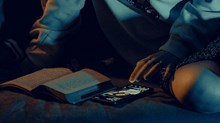For Better or Worse
By Elesha Coffman, assistant editor of CHRISTIAN HISTORY
This week's featured article at the Christian History Web site, "Tested on All Sides," comprises excerpts from the diary of Mary Richardson Walker (1811-1897), a pioneer missionary to the Oregon Territory. She kept a diary her whole life, opening a window into 1800s family life, ministry, and major events like traveling the Overland Trail. Her husband, Reverend Elkanah Walker (1805-1877), began a diary as well in 1841. Their different renderings of the same days highlight their distinct roles and unique personalities—and the huge differences between their time and ours.
Saturday, December 25, 1841
Mary: Made, cut & made two pair drawers for A. & a dress & one pair for Elizabeth. My health good except I can not sit long without my sides aching [Mary was pregnant at the time] so I mix in my house work to rest me & sew a great part of the time.
Elkanah: Taught the children in the morning. I had a request to let the Indians thrash the wheat of the Chief in the new house but did not consent.
Wednesday, March 16, 1842
Mary: Rose about 5 o'clock, had an early breakfast, got my house work done up about 9. Baked six more loaves of bread. Made a kettle of mush & have made out to put my clothes away & set my house in order. May the mercy of the Merciful be with me through the expected scene. Nine o'clock p.m. was delivered of a son.
Elkanah: Mrs. W. was safely delivered of a son this evening. We have every reason for gratitude from our heavenly father for his unnumbered mercies.
Thursday, March 17, 1842
Mary: Rested pretty well last night. The rain disturbed me some. My little boy laid still all night. We call his name Marcus Whitman [after another missionary to the Oregon Territory].
Elkanah: The snow was much gone in the plain. We had a very comfortable night, notwithstanding the sickness of Mrs. W. … [She is] as comfortable as we could expect & [I] find it quite hard to take care of the house.
Sunday, September 18, 1842
Mary: Mr. E. [fellow missionary Cushing Eells] went to the river & Mr. Walker staid at home. I feel depressed. My children, especially Cyrus, is a heaviness to me particularly on the Sabbath day. It is as if he was almost possessed with some demon, he is so noisy. I do not know what to teach him first about his Maker.
Elkanah: Went out and caught my horse & thought of myself & concluded that my feelings were the suggestions of the evil one to destroy my peace & usefulness. This has relieved my mind in a measure & I pray that I may have the grace to serve God faithfully, let my end be when it may. Had worship with the Indians about noon & then again about four o'clock & went in the evening & had some talk with the Chief.
The American Board of Foreign Missions, which had sent the Walkers and two other couples out West, closed its Oregon operations in 1853. The Walkers stayed, turning to full-time farming to support their eight children. Mary outlived Elkanah by 20 years, and though she had once found him "an ordinary kind of unaspiring man" and been tempted while he courted her "to throw the bargain off on someone else," after his death she wrote, "I think of so many things I want to tell Mr. Walker. I realize more and more how much more I loved him than anyone else."
* For more diaries like those of the Walkers, see Women of the West by Cathy Luchetti and Carol Olwell (Three Rivers, 1982) and Under God's Spell, also by Luchetti (HBJ, 1989).
Elesha can be reached at cheditor@ChristianityToday.com.
Copyright © 2000 by the author or Christianity Today/Christian History magazine.
Click here for reprint information on Christian History.

Support Our Work
Subscribe to CT for less than $4.25/month




























